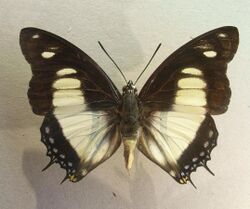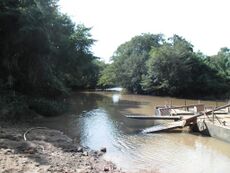Biology:Charaxes nobilis
| Charaxes nobilis | |
|---|---|

| |
| Scientific classification | |
| Domain: | Eukaryota |
| Kingdom: | Animalia |
| Phylum: | Arthropoda |
| Class: | Insecta |
| Order: | Lepidoptera |
| Family: | Nymphalidae |
| Genus: | Charaxes |
| Species: | C. nobilis
|
| Binomial name | |
| Charaxes nobilis | |
| Synonyms | |
| |
Charaxes nobilis, the noble white charaxes, is a butterfly in the family Nymphalidae. The species was first described by Herbert Druce in 1873. It is found in Guinea, Ivory Coast, Ghana, Nigeria, Cameroon, Gabon, the Republic of the Congo, the Central African Republic, the Democratic Republic of the Congo and Uganda.[3]
Description
Ch. nobilis Druce male: wings above black with a common cream-coloured median band, on the hindwing very broad (about 20 mm.), on the forewing gradually narrowed and terminating in cellule 3 in a free spot; the forewing in addition with a light yellow spot in cellules 5 and 7; the black marginal band of the hindwing about 9 mm. in breadth, with blue submarginal spots and marginal streaks and an orange-yellow anal spot; hindwing beneath with three thick, curved, black transverse lines beyond the middle, enclosing three rows of white spots, the middle one composed of large, the others of streak-like spots; at the anal angle a large orange-yellow spot enclosing two black eye-spots with bluish pupils. The female differs in having the median band on the upper surface much broader (on the hindwing 23–25 mm., on the forewing in cellule 2 19–20 mm.) and almost white, and bears in addition an elongate white spot in cellule 6 on the forewing above. Old Calabar, Cameroons, Congo; everywhere rare. [4]
Biology
The habitat consists of lowland evergreen forests. Notes on the biology of nobilis are given by Schultze (1916) and Larsen (2005). [5][6]
Subspecies
- Charaxes nobilis nobilis (southern and eastern Nigeria, Cameroon, Gabon, Congo, Central African Republic, Democratic Republic of the Congo, Uganda)
- Charaxes nobilis claudei le Moult, 1933 [7] (north-western Guinea, Ivory Coast, Ghana, south-western Nigeria) Raised to a full species by Eric Vingerhoedt.[8]
- Charaxes nobilis rosaemariae Rousseau-Decelle, 1934[9] (Democratic Republic of the Congo: Lualaba, Shaba)
Taxonomy
Charaxes nobilis group.
The supposed clade members are:
- Charaxes nobilis
- Charaxes superbus
References
| Wikimedia Commons has media related to Charaxes nobilis. |
- Notes
- ↑ Druce, H. 1873. Description of a new species of Charaxes from Africa. Entomologist’s Monthly Magazine 10: 13-14.
- ↑ Savela, Markku (March 23, 2019). "Charaxes nobilis Druce, 1873". https://www.nic.funet.fi/pub/sci/bio/life/insecta/lepidoptera/ditrysia/papilionoidea/nymphalidae/charaxinae/charaxes/#nobilis. Retrieved December 23, 2019.
- ↑ "Afrotropical Butterflies: File H - Charaxinae - Tribe Charaxini". http://atbutterflies.com/downloads/nymphalidae_charaxini.doc.
- ↑ Aurivillius, [P.O.]C. 1908-1924. In: Seitz, A. Die Großschmetterlinge der Erde Band 13: Abt. 2, Die exotischen Grosschmetterlinge, Die afrikanischen Tagfalter, 1925, 613 Seiten, 80 Tafeln (The Macrolepidoptera of the World 13).Alfred Kernen Verlag, Stuttgart.
 This article incorporates text from this source, which is in the public domain.
This article incorporates text from this source, which is in the public domain.
- ↑ Larsen, T.B. 2005 Butterflies of West Africa. Apollo Books, Svendborg, Denmark: 1-595
- ↑ . Schultze, A. 1916. Die Charaxiden und Apaturiden der Kolonie Kamerun. Archiv für Biontologie 4: 83-129.
- ↑ le Moult, E. 1933. Formes nouvelles ou peu connues de Charaxidinae (Lep., Nymph.).Novitates Entomologicae 3: 16-18
- ↑ "African Charaxes/Charaxes Africains Eric Vingerhoedt, 2013". Archived from the original on 2013-06-27. https://archive.today/20130627224134/http://www.charaxes.be/systematic/systligth/nobilisgrp/claudei/claudei.html.
- ↑ Rousseau-Decelle, G. 1934. De quelques formes nouvelles de Charaxes africains. Bulletin de la Societe Entomologique de France 39: 228-236.
- Sources
- Victor Gurney Logan Van Someren, 1974 Revisional notes on African Charaxes (Lepidoptera: Nymphalidae). Part IX. Bulletin of the British Museum of Natural History (Entomology) 29 (8):415-487. [1]
- Seitz, A. Die Gross-Schmetterlinge der Erde 13: Die Afrikanischen Tagfalter. Plate XIII 31
- Charaxes.be/systematic Nominate
- Charaxes.be/systematic Subspecies.
External links
- Images of C. nobilis Royal Museum for Central Africa (Albertine Rift Project)
- Images of C. nobilis rosaemariae (Albertine Rift Project)
- Charaxes nobilis images at Consortium for the Barcode of Life
- Charaxes nobilis nobilis images at BOLD
- Charaxes nobilis claudei images at BOLD
- Charaxes nobilis rosemariae images
- Charaxes claudei images at BOLD
Wikidata ☰ Q13577684 entry
 |


